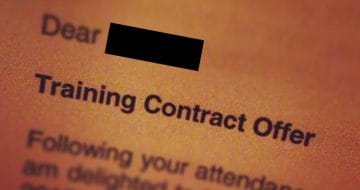A future trainee solicitor offers their post-exam reflections

The Solicitors Regulation Authority (SRA) introduced the Solicitors Qualifying Exam (SQE) in September 2021. The SRA aimed to standardise the qualification whilst improving accessibility to the profession; however, its implementation has been fraught with problems.
I sat the SQE1 in January 2024 and scored in the top quintile for both exams on my first attempt. However, despite my strong performance and having navigated A-Levels, an undergraduate degree, and a post-graduate diploma in law with top marks, I have never sat an exam that was so unfairly punitive. Below are a number of issues I have encountered in the current system.
Signing of a Non-Disclosure Agreement (NDA)
The requirement for candidates to sign an NDA before sitting each exam effectively silences candidates from openly discussing their exam experiences. This lack of open communication not only deprives candidates and the SRA of valuable insights and feedback that could be used to improve the exams, but also means there is limited accountability for any potential irregularities in the administration of the SQE. A quick search online would unearth several alleged, unacceptable issues candidates have faced which I will not go into further detail with here, as I do not wish to breach the NDA in any form.
Prohibitive exam fees
Students must pay a total of £4,564 to sit the SQE (£1,798 for SQE1 — two 180-questions multiple choice exams — and £2,766 for SQE2 — a series of written and oral examinations). This is likely to increase to approximately £5000 due to inflation, as they did last year. This is significantly more expensive than comparable exams abroad, such as the New York Bar which costs $250 (£197) if you attended law school locally and $750 (£590) if are a foreign student.
Furthermore, there are no discounts for resits, unlike for the LPC resits which cost between £75 and £300. Peers have also highlighted the extra expenses incurred for booking travel and accommodation to attend the oral portion of the SQE2 exams. These exams are spread across two days and are currently offered exclusively in Birmingham, Cardiff, London, and Manchester.
These high costs place an undue burden on aspiring solicitors, particularly affecting those from lower socio-economic backgrounds; I fear this may dissuade them from pursuing a legal career. I recognise that without funding from my firm, sitting these exams would have been financially unfeasible.
Cost of the preparation courses
Whilst candidates may sit the SQE without any formal legal background and self-study, a large number do choose to complete a prep course. Prices for full SQE preparatory courses vary widely, ranging from approximately £3,000 to £19,750. Several factors influence these costs, including location, whether the candidate already possesses a law degree (i.e., will they have to undertake the PGDL element as I did), the extent of in-person teaching provided, and whether the course includes a master’s component.
Additionally, within some of these courses there are different pricing tiers which offer varying access to materials, revision notes, and importantly, past papers. This seems to create an uneven playing field, favouring candidates who can afford higher-priced options or those with access to employer-funded training contracts. Moreover, for many candidates, once the costs of exams and preparatory courses are combined, the SQE is more expensive than the LPC it replaced — this is contrary to the SRA’s explicit aims of introducing the SQE to boost accessibility to the legal profession. This disparity underscores the financial challenges faced by aspiring solicitors and raises concerns about equitable access to professional training.
Content / past papers
The SRA’s failure to provide a comprehensive exam specification or meaningful past papers has left course providers in the dark, leaving them with no option other than to make educated guesses regarding the exam content. Consequently, different providers offer varying interpretations, making it challenging for candidates to pinpoint exactly what they need to study. This ambiguity was particularly evident around grey areas of law, resulting in confusing discrepancies amongst providers in their answers to multiple-choice questions (MCQs).
The reason I had to use different providers was because the SRA only released 1 sample paper for each SQE1 exam. Therefore, I had to purchase more materials from external sources at a considerable cost to ensure I could practice comprehensively. I am glad I did, as the samples provided were deceptively easy compared to the real thing.
Releasing past papers or creating a detailed, focused specification would enable providers to better align their materials with the exam’s content and level of difficulty, thereby improving learning outcomes for students. Additionally, this would empower solo candidates to tailor their preparation more effectively, rendering it a more accessible option.
Best-answer MCQs are a poor method of examining candidates
Unlike traditional multiple-choice questions where only one answer is correct, “best answer” questions require candidates to select the most appropriate response from the 5 options provided. Whilst some answers may be clear-cut, determining the “best” option often involves subjective interpretation, particularly in contentious areas of law. Additionally, these questions sometimes delved into extremely niche topics that are inadequately covered in preparation materials. Moreover, these questions had to be completed, on average, within 1 minute and 40 seconds, in gruelling 2 hours and 39 minutes sessions where access to water was restricted (you had to go outside the test room in order to drink whilst the time continued). This is hardly representative of the working conditions of a solicitor.
Course provider pass rate vs self-study pass rate
The SRA has not disclosed pass rates for candidates who self-study versus those who attend preparatory courses, nor have they provided pass rates for individual course providers. This lack of transparency impedes candidates’ ability to make informed decisions about their exam preparation. Without knowing the effectiveness of self-study versus formal courses or the performance of different providers, candidates risk investing in inadequately prepared providers. The promised release of this information by the SRA, which has been delayed, would greatly enhance candidates’ ability to prepare effectively for the exams.
Three attempts within six years
The provision restricting candidates to three attempts within a six-year period appears disproportionately punitive, especially when you consider the teething problems candidates have faced and that similar exams such as the New York Bar do not impose similar limitations.
I hope that by outlining the issues I have identified on the SQE1, this will prompt others to come forward with their own experiences and ultimately lead to the SRA acting upon these shortcomings for the betterment of candidates and the profession as a whole.
Concerned SQE Student is a future trainee solicitor and current SQE student.


